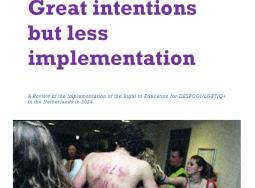Critical review of LGBTIQ+ education policy in the Netherlands shows inner workings of a supportive state

17 May 2024 - Today GALE publishes a new review of the DESPOGI/LGBTIQ+ education policy In the Netherlands. As usual, GALE checked the national education policy on the 15 checkpoints of the GALE Checklist. In 2017, GALE scored the Dutch policy as 95%, which falls in the supportive range. In 2024, GALE rated the Netherlands as 73%, which still falls in the supportive range but in the lower part of it. The elaborate review shows how even a supportive state struggles to make steps forward. Making policy and initiating interventions is one thing but having an impact on the social realities is considerably more challenging.
Lower score
In the first country review of the Netherlands in 2017, GALE scored the Netherlands 95% supportive (with 11 items supportive, 3 items encouraged, and 1 item unknown). The Netherlands are considered to have entered the “supportive” (or mainstreaming) phase in 2001, when the government adopted an active LGB education policy for the first time.
In 2024, GALE scores the Netherlands with 73% (with 2 items supportive, 10 items encouraged and 3 items no policy). The current focus on LGBT GSAs, on LGBT peer education and the lack of willingness to follow up on research signals is more typical of the ambiguous phase than the supportive phase. However, the Netherlands is still in the supporting phase in percentage terms.
Good intentions, a lot of action, little impact
This substantial reduction is mainly due to the review showing little progress on policy implementation on the school level and on the lack of impact of the policy on the social level, in combination with a political and organizational unwillingness to ensure effective implementation specifically for DESPOGI students. The lack of impact is partly also due to a lack of ability (due to decentralization and deregulation).
A main explanation for this lower score is that successive neoliberal governments stated great intentions but leave the implementation to schools and their supporting educational institutions. The expectation is that own responsibility and competition will automatically lead to higher quality and inclusion. However, this does not work out this way.
At the same time, it is not helpful that the national LGBT organization mainly focuses on promoting it’s own LGBT peer-based interventions (like GSAs and LGBT peer-education) and on urging the Inspectorate of Education to increase its control of schools (which is currently an unrealistic demand), rather than on an evidence-based mainstreaming strategy for the education sector.
Struggles to move forward in a “supportive” country
The report show how larger political and social movements like neoliberalism impact the potential to influence to social reality of LGBTIQ+ students in schools. Especially in countries with a decentralized system, there is a huge need to tailor interventions to each school. In such a context, there needs to be a strong national supportive policy which not only encourages schools to do the right thing but also supports them with monitoring, the development of good practices, effect and impact research. There also needs to be a policy feedback loop that secures when strategies fail, they are replaced with strategies and interventions that are more likely to succeed.
The report also shows how LGBTIQ+ organizations who are mainly looking out for maintaining their own position and funding may become their own enemy in a more supportive state. In the GALE Committee Guide, GALE already outlined how LGBTQI+ organizations need to reposition themselves from advocacy organizations (in the ambiguous phase of states) to consultancy organizations (in supportive states). They should start cooperating with the government rather than just make demands. It seems that in the Netherlands, the main LGBT organization has not yet succeeded in making this shift.
The right-wing parties who won the recent elections may well pose a risk for the current policy. Much of the policy implementation is dependent on the funding of COC Netherlands, but the consolidation in mainstream policies and the education system is still lacking. Without such systemic integration, it may be that the positive attitude of the cisgender heterosexual population is not stable enough to maintain political support.
Sources:
English: Great intentions but less implementation. A Review of the Implementation of the Right to Education for DESPOGI/LGBTIQ+ in the Netherlands in 2024
Dutch: Goede bedoelingen, maar minder uitvoering. Een overzicht van de implementatie van het recht op onderwijs voor DESPOGI/LHBTIQ+ in Nederland in 2024
GALE Committee Guide (2017)


